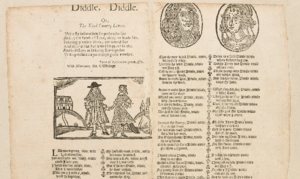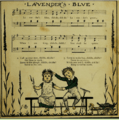Lavender's Blue facts for kids
Quick facts for kids Lavender's Blue |
|
|---|---|
| English folk song | |

A 17th-century broadside version of the ballad
|
|
| Catalogue | Roud 3483 |
| Genre | Nursery rhyme |
| Published | English broadside (before 1680) |
| Comment | collected in the UK & US |
"Lavender's Blue" (sometimes called "Lavender Blue") is an English folk song and nursery rhyme dating to the 17th century. It has a Roud Folk Song Index number of 3483. It has been recorded in various forms since the 20th century and some pop versions have been hits in the US and UK charts.
Lyrics
There are as many as thirty verses to the song, and many variations of each verse. A typical version, described by James Halliwell in 1849, is:
- Lavender's blue, dilly dilly, lavender's green,
- When I am king, dilly dilly, you shall be queen:
- Who told you so, dilly dilly, who told you so?
- 'Twas mine own heart, dilly dilly, that told me so.
- Call up your men, dilly dilly, set them to work,
- Some with a rake, dilly dilly, some with a fork;
- Some to make hay, dilly dilly, some to thresh corn,
- Whilst you and I, dilly dilly, keep ourselves warm.
- If you should die, dilly dilly, as it may hap,
- You shall be buried, dilly dilly, under the tap;
- Who told you so, dilly dilly, pray tell me why?
- That you might drink, dilly dilly, when you are dry.
20th century
Burl Ives' hit version, titled "Lavender Blue", was featured in the Walt Disney film So Dear to My Heart, and was nominated for the Academy Award for Best Original Song. Subsequently there was a revival of interest in the song, several versions of which have been released in the US and the UK and achieved success in the charts. These include Sammy Kaye's 1949 version, charting at #5; Dinah Shore's in 1949 on her album Lavender Blue went to #1 on the Australian chart; and Sammy Turner's in 1959 reached #3 on the Billboard Hot 100. In 1976, the early music group The City Waites recorded the original 17th-century version of "Lavender's Green, Lavender's Blue" on their album Pills to Purge Melancholy. And on their 1985 album Misplaced Childhood, the British band Marillion recorded a song called "Lavender", which had lyrics derived from the folk song and became a number 5 hit on the UK singles chart.
Images for kids


